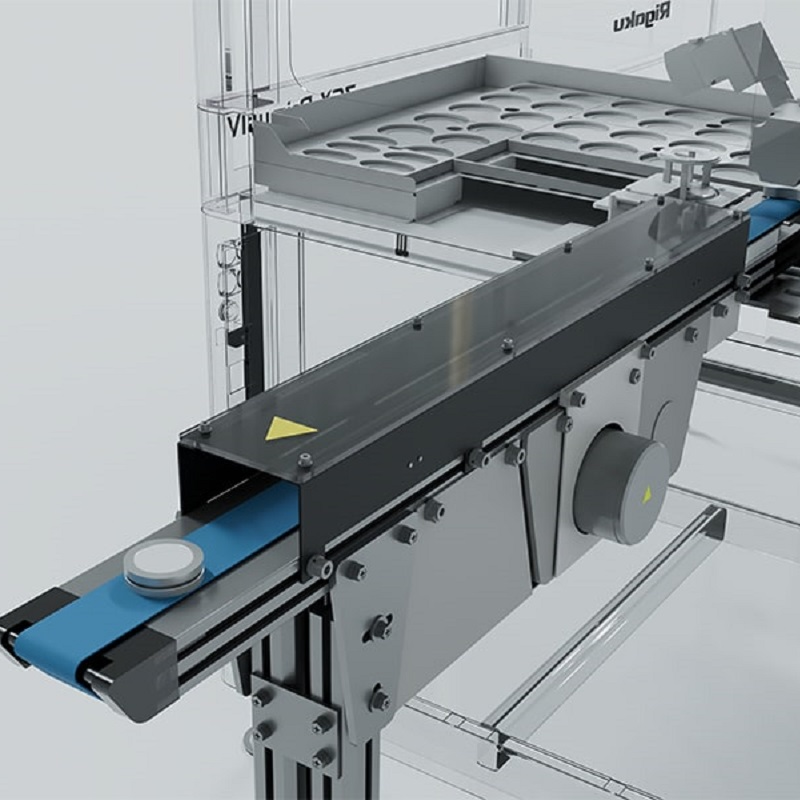ZSX Primus IV
Tube-Above Sequential Wavelength Dispersive X-ray Fluorescence Spectrometer
Elemental analysis of solids, liquids, powders, alloys and thin films
As a tube-above sequential wavelength dispersive X-ray fluorescence (WDXRF) spectrometer, the Rigaku ZSX PrimusIV delivers rapid quantitative determination of major and minor atomic elements, from beryllium (Be) through uranium (U), in a wide variety of sample types — with minimal standards.



ZSX Primus IV Overview
New ZSX Guidance expert system XRF software
ZSX Guidance supports you in all aspects of XRF measurement and data analysis. Can accurate analysis only be performed by experts ? No—that is in the past. ZSX Guidance software, with the built-in XRF expertise and know-how of skilled experts, takes care of sophisticated settings. Operators simply input basic information about samples, analysis components and standard composition. Measured lines with the least overlap, optimum backgrounds and correction parameters (including line overlaps) are automatically set with aid of qualitative spectra.
Exceptional light element XRF performance with inverted optics for superior reliability
ZSX PrimusIV features an innovative optics-above configuration. Never again worry about a contaminated beam path or down time due to sample chamber maintenance. The optics-above geometry eliminates cleaning worries and increases up time. Providing superior performance with the flexibility for analyzing the most complex samples, the ZSX PrimusIV WDXRF spectrometer features a 30 micron tube, the thinnest end-window tube available in the industry, for exceptional light element (low-Z) detection limits.
Mapping and multi-spot XRF analysis
Combined with the most advanced mapping package to detect homogeneity and inclusions, the ZSX PrimusIV allows easy detailed XRF spectrometric investigation of samples that provide analytical insights not easily obtained by other analytical methodologies. Available multi-spot analysis also helps to eliminate sampling errors in inhomogeneous materials.
SQX fundamental parameters with EZ-scan software
EZ-scan allows users to perform XRF elemental analysis of unknown samples without any prior setup. This time saving feature requires only a few clicks of the mouse and a sample name to be entered. Combined with SQX fundamental parameters software, it provides the most accurate and rapid XRF results possible. SQX is capable of automatically correcting for all matrix effects, including line overlaps. SQX can also correct for secondary excitation effect by photoelectrons (light and ultra-light elements), varying atmospheres, impurities and different sample sizes. Increased accuracy is achieved using matching library and perfect scan analysis programs.
Nitrogen or Helium Flush mechanism
Nitrogen gas can now be used as the atmospheric gas in place of helium. When nitrogen gas is used, the SQX analysis range is 15P to 96Cm. When measuring in nitrogen atmosphere, the standard option “SQX scattering FP method” is not applicable.
ZSX Primus IV Features
ZSX Primus IV Videos
ZSX Primus IV Specifications
| Technique | Wavelength dispersive X-ray fluorescence (WDXRF) | |
|---|---|---|
| Benefit | Elemental analysis of solids, liquids, powders, alloys and thin films | |
| Technology | Tube-above sequential WDXRF | |
| Attributes | 3 or 4 kW sealed X-ray tube, 48-position autosampler, analyze Be to U, vacuum | |
| Options | He-flush, additional analyzing crystals, r-θ stage/mapping | |
| Computer | External PC, MS Windows OS, ZSX software | |
| Dimensions | 1310 (W) x 1470 (H) x 890 (D) mm | |
| Mass | Approx. 620 kg (core unit) | |
| Power requirements | 1Ø, 200 VAC 50/60 Hz, 8 kW | |
ZSX Primus IV Options
The following accessories are available for this product:
Automation Solution
Automatically transports measurement samples to the instrument, enabling continuous measurement.
ZSX Primus IV Application Notes
The following application notes are relevant to this product
-
XRF1131 - Standardless FP Analysis of Lithium-ion Battery Cathode Material LiFePO₄ by ZSX Primus IV
-
BATT1021 - Composition Analysis for Argyrodite-Based Sulfide Solid Electrolyte Material
-
BATT1007 - Impurity Analysis for Graphite Anodes
-
BATT1006 - Impurity Analysis for NCM Cathode Material
-
BATT0004 - Chemical Composition Analysis of NMC Cathode
-
BATT0001 - Battery Material Development
-
WDXRF1099 - Trace Element Analysis in Geological Samples by the Pressed Powder Method, using GEO-TRACE-PAK
-
WDXRF1085 - Trace Element Analysis for Water Solution by Micro-droplet Method using Ultra Carry Filter Paper
-
WDXRF1071 - Semi-quantitative FP Analysis of Geological Samples
-
WDXRF1023 - Pt, Rh and Pd Analysis of Used Automobile Catalyst by WDXRF
-
WDXRF1084 - Mapping and Small Spot Analysis with a General-Purpose XRF Spectrometer
-
WDXRF1101 - Fused Bead Analysis for Refractories using Application Package Refractory Series
-
WDXRF1100 - Fused Bead Analysis for Wide Concentration Ranges of Various Oxide Materials using OXIDE-FB-PAK
-
WDXRF1092 - Fixed Angle Measurement using the Semi-Quantitative Analysis Function SQX of ZSX Guidance Software
-
WDXRF1096 - Fe, Ni and Co Based Alloy Analysis by Fundamental Parameter Method using ZSX Primus III+
-
WDXRF1070 - Chlorine Analysis of Aluminosilicate for Fluid Catalytic Cracking Catalyst by WDXRF
-
WDXRF1086 - Boron and Fluorine Quantitative Analysis for Water Solution by Micro-droplet Method using Ultra Carry Filter Paper
-
WDXRF1088 - Boron Analysis in Glass Powder
-
WDXRF1091 - Beryllium Analysis in Beryllium Copper Alloy using ZSX Primus IV with RX85
-
WDXRF1109 - Automatic Quant Application Setup Applied to Calibrating Coal Fly Ash Fused Beads
-
WDXRF1089 - Analysis of Hazardous Heavy Elements in Soil and Sediment using ZSX Primus IV
ZSX Primus IV Resources
Webinars
| Analysis of Hazardous Heavy Elements in Soil and Sediment | Watch the Recording |
| Building Quantitative XRF Methods on the ZSX Primus IV for Pharmaceuticals | Watch the Recording |
| A Non-Destructive XRF Technique for Rapid and Easy Screening of Residual Catalysts in APIs and Intermediates | Watch the Recording |
| Direct CNOX analysis of solid forms for confirmation of composition and determination of salts/stoichiometry, hydrates, and solvates by WDXRF | Watch the Recording |
| The Use of Easy XRF Elemental Analyses Techniques to Support the Development of Pharmaceutical Formulations | Watch the Recording |
| Quality control of API potency, excipient blend uniformity, and heavy metals impurities by non-destructive and direct analysis of intact pills by XRF | Watch the Recording |
Rigaku Journal articles
| Read the Article | |
| Read the Article | |
| Read the Article | |
| Read the Article | |
| Read the Article | |
| Read the Article | |
| Read the Article | |
| Read the Article | |
| Read the Article | |
| Read the Article | |
| Read the Article | |
| Read the Article | |
| Read the Article | |
| Read the Article | |
| Read the Article | |
| Read the Article | |
| Read the Article | |
| Read the Article | |
| Read the Article |
ZSX Primus IV Events
Learn more about our products at these events
-
EventDatesLocationEvent website
-
Webinar: Quantitative Analysis with XRF – Calibration Steps for Accurate ResultsFebruary 27 2026 - February 27 2026Webinar
-
Prospectors & Developers Assoc of Canada 2026March 1 2026 - March 4 2026Toronto, ON, Canada
-
Anwendertreffen Röntgenfluoreszenz- und FunkenemissionsspektrometrieMarch 3 2026 - March 4 2026Münster, Germany
-
Rigaku UK User Meeting 2026March 4 2026 - March 5 2026Oxfordshire, UK
-
Pittcon 2026March 9 2026 - March 11 2026San Antonio, TX, USA
-
APS 2026March 16 2026 - March 20 2026Denver, CO, USA
-
ACS Spring 2026March 22 2026 - March 26 2026Atlanta, GA, USA
-
International Battery 2026March 23 2026 - March 26 2026Orlando, FL, USA
-
AnalyticaMarch 24 2026 - March 27 2026Munich, Germany
-
Chembio ExhibitionApril 15 2026 - April 16 2026Helsinki, Finland
-
MRS Spring 2026April 26 2026 - May 1 2026Hawaii, HI, USA
-
Canadian Chemistry Conf 2026May 24 2026 - May 28 2026Toronto, ON, Canada
-
3rd Global CemCCUS Conference, ExhibitioJune 9 2026 - June 10 2026Hamburg, Germany
-
Denver X-ray Conference (DXC) 2026August 3 2026 - August 7 2026Lombard, IL, USA
-
12th Pacific Rim International Conference on Advanced Materials and Processing (PRICM12)August 9 2026 - August 13 2026Gold Coast Queensland, Australia
-
ACS Fall 2026August 23 2026 - August 27 2026Chicago, IL, USA
-
MS&T 2026October 4 2026 - October 7 2026Pittsburgh, PA, USA
-
GSA 2026October 11 2026 - October 14 2026Denver, CO, USA
-
Gulf Coast Conference (GCC) 2026October 13 2026 - October 15 2026Galveston, TX, USA
-
AAPS PharmSci 360 - 2026October 25 2026 - October 28 2026New Orleans, LA, USA
-
SERMACS 2026November 4 2026 - November 7 2026Memphis, TN, USA
-
Eastern Analytical Symposium (EAS) 2026November 16 2026 - November 18 2026New Jersey
-
MRS Fall 2026November 29 2026 - December 4 2026Boston, MA, USA
-
Advanced Automotive Battery Conf 2026December 8 2026 - December 11 2026Las Vegas, NV, USA
ZSX Primus IV Training
Upcoming training sessions
-
TitleDatesCostLocationNotesCourse outlineRegistration form
-
ZSX Primus IV & Supermini200 training (EMEA)February 23 2026 - February 25 2026Please contact ECOE@rigaku.comNeu-Isenburg, GermanyZSX Primus IV & Supermini200 training
-
WDXRF training (USA)April 13 2026 - April 15 2026$5000Hybrid; The Woodlands
-
ZSX Primus IV & Supermini200 training (EMEA)September 14 2026 - September 16 2026Please contact ECOE@rigaku.comNeu-Isenburg, GermanyZSX Primus IV & Supermini200 training
-
WDXRF training (USA)October 19 2026 - October 21 2026$5000Hybrid; The Woodlands
-
ZSX Primus IV & Supermini200 training (EMEA)November 30 2026 - December 2 2026Please contact ECOE@rigaku.comNeu-Isenburg, GermanyZSX Primus IV & Supermini200 training
ZSX Primus IV

Contact Us
Whether you're interested in getting a quote, want a demo, need technical support, or simply have a question, we're here to help.

